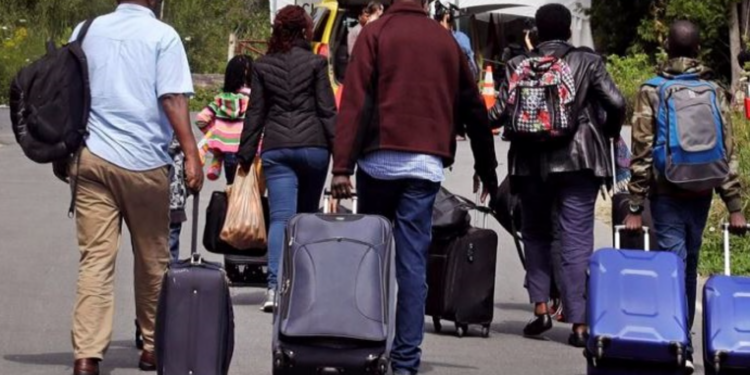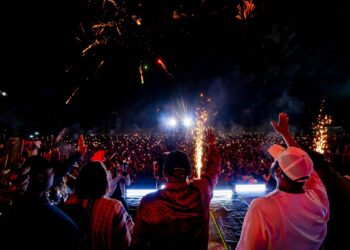December has come and gone, but the memories of a different kind of year-end linger.
This last December was one of diaspora invasion. Nigerians of all tribes, ages, and genders poured in from the farthest corners of the world, particularly Britain, the USA, and Canada, on a pilgrimage reminiscent of the Israelites’ focus on The Promised Land.
Like all pilgrimages over millennia, this one got a name—“Detty December.” And was it detty??? The regular hotels from Ikeja to Victoria Island were filled to capacity, and the Airbnbs across the Lekki Peninsula could not cope with the sudden saturation of guests occupying rooms and apartments that had remained largely empty all year round.
The restaurants rolled out fine dining, and amala joints were doing brisk business, while nsala soup and edikaikong were visited upon with gusto!
Not to be outdone, the nightclubs fizzled, sizzled, and popped with klieg lights, earthshaking music, and assorted entertainment.
Tequilas competed with Champers, and whiskies fought for attention by name and age. It was a case of ‘eat, drink, and be merry, for tomorrow you shall start again’!
The curious case of the returnees
The curious fact is that these are the same Nigerians who, in the past decade, had uprooted themselves and virtually sworn off the country as a troubled, problem-ridden environment. They had joined the ‘Japa’ (gone for good) one-way ticket to ‘the abroad’ generation.
So one wonders, what could be the reason behind this pullback, this magnetic effect? Just when the cry of the extreme downward turn in the quality of life in the country is reaching deafening decibels, why would someone who has, to all intents and purposes, worked back-breaking double shifts in foreign cold weather deem it fit to plunk all of their savings on a two-week unbridled bacchanalia in the very same place they ran away from?
To start discerning the rationale behind this strange occurrence, it would be good to meet some members of this brigade.
Chidi is 28, a typical London boy, born and raised by Nigerian parents in Bromley. His first time back home was Christmas of 2019, just before the COVID-19 lockdown, for an aunt’s funeral.
At 24 then, six feet two with a chiselled body and a full head of cornrows, he got more than enough attention from damsels. As a British-Nigerian, he was used to the food and the culture.
The entertainment scene in VI and Lekki was thrilling and out of this world. Since the end of the lockdown, he’s made the journey back every December.
Baba Tola made his way to Baltimore, Maryland, via Boundary, Ajegunle, 40 years ago during the ‘Andrew Wan Check-Out’ surge out of the country in the mid-eighties.
He had quickly discovered that his university degree wasn’t going to put burgers on the table for his fast-growing family, so he keyed into construction along with Hispanic immigrants.
When age set in and the knees became too wonky for heights, he took to driving taxis.
The wake-up call came when his son, Tolani, proposed to an Ijebu girl in the same neighbourhood of Park Heights, and the Nigeria-based parents insisted on a Lagos wedding.
The trip back home after thirty-five years was more of a windscreen wiper than an eye-opener. Mheeen!!!
Things had changed! The streets were wide, the houses were posh, and his family and friends had moved on to better lives. While not regretting the strides he had made, with two fully paid houses in his name and the kids doing well across America, he really felt homesick.
His old Unilag friends doted on him and sprayed him endlessly during the wedding reception. He bought a flat in Lekki and has been back every December since then.
Tanya is another case in point. She grew up in an upper-middle-class Surulere family, went to a private school, and did Elect/Elect with an emphasis on algorithms and computing at one of the respected private universities in Lagos.
Post-graduation, she became a highly regarded member of the Yaba Tech Hub, the group of computing nerds that Zuckerberg had to pay a visit to some years ago.
Needless to say, she and her crew followed the flashing lights to Toronto, Canada, about six years ago, and things have been up and up for them. But life in the freezer has been dull and mundane.
Toronto is just one grey zone compared to Lasgidi. So, every December, they block an Airbnb in Phase 1 and just generally have a blast connecting with old friends, doing the rounds of top-notch music concerts, and doing what girls do.
To them, Lagos is an escape valve, a release from the year-long drudgery of keeping up with the rat race and corporate expectations. It’s me time! And WoW! It sure is well worth it.
The magnetic pull of Nigeria
These three lives are quite different and apart from each other but share one common thread—the search for a place to belong, to be relevant, and to be accepted without conditionalities.
A place where you could just be yourself. But this is the same place where people are still selling all their worldly goods and abandoning otherwise stable lives to go find the proverbial ’greener pasture’.
So what has changed to create a beacon for diasporans to trace their steps back to Nigeria, and Lagos in particular? One of the major factors is the recent set of young Naija emigrants.
The new age diaspora influence
A sister who trades African foods and drinks in the UK exclaimed that she had never seen a more ethnically definitive group of our people in all of her over thirty years abroad.
As she puts it, “They stick to pidgin English, eat mostly Eba, amala, or poundo yam with ogbono, vegetable, and cow leg or ponmo, plus they would rather be seen in traditional attires.”
Rather than adapt to their new environments, their panache and vibrant lifestyle compel those around them to adopt the Naija way. All of this rides on the back of the international success of Afrobeats—the beat-driven, polyphonic, totally danceable music being churned out from Nigeria to the world by the likes of Burna Boy, Davido, and Whizzy.
There are also the decades-old movies from Nollywood, many of which portray African families living the grandeur and glitz of Hollywood.
A future beyond ‘Detty December’
We’ve gradually transitioned from the green passport being notorious for potential lawbreakers to the present scenario where officers at international entry points are asking you if you’ve met Ayra Starr in person.
In short, we’ve been on a decade-long diplomatic and economic soft sell, unfortunately without the active participation of the government.
The private investment in the entertainment and hospitality industries is mind-boggling.
The Lekki area of Lagos, in particular, has benefited from the establishment of massive food outlets, from international fast foods to local delicacies ensconced in edifices not seen elsewhere.
To ride the current wave and take advantage of this new phenomenon, it would be necessary for the government to chart clear policies at the state and federal levels to encourage not only Nigerians but also foreigners to want to come too. It all goes beyond grooving and having a party.
The same young adults rocking and partying today are also the future investors in the economy. They will have families, will get tired of hotels, and will want some permanent residence in their place of origin.
There’s a need to see beyond the bright lights of Detty December to a time when our people in foreign lands would want to ’japada’ (make their way back) and declare that “North, south, east, and west, home is the best.”
This article is contributed by Emiko Aruofor




















